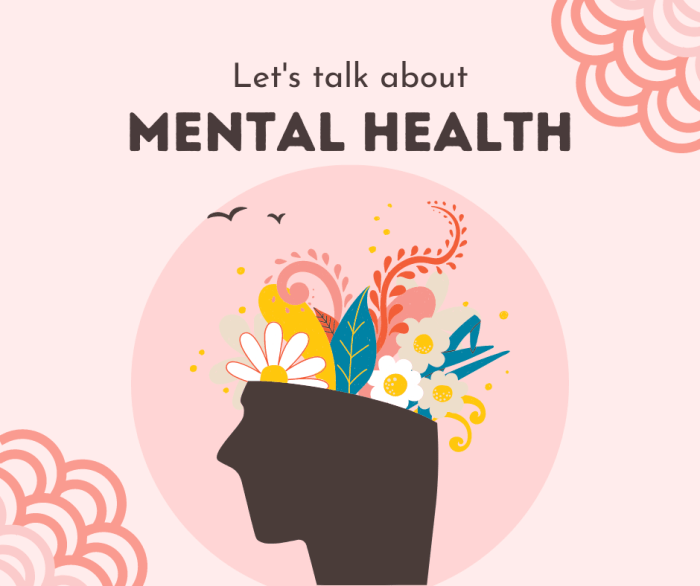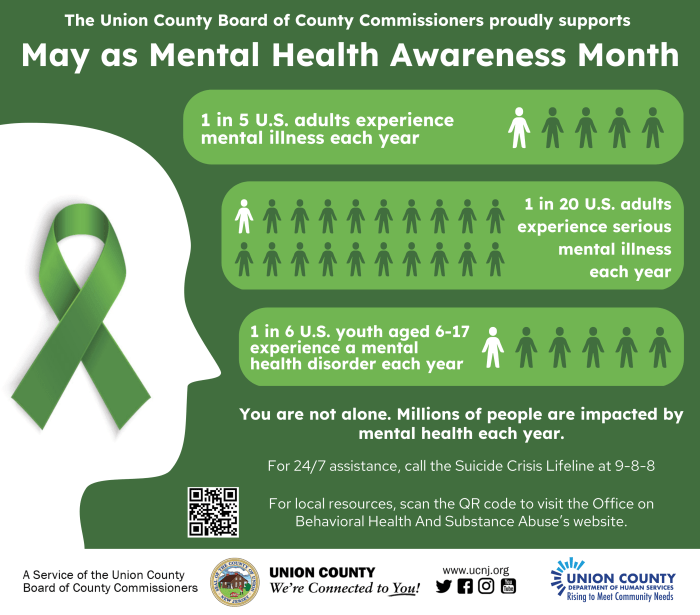Mental Health Awareness is a critical aspect of modern society, impacting individuals, communities, and workplaces. Through increased awareness, we can combat the stigma surrounding mental health and promote overall well-being.
Exploring the importance of mental health awareness and its far-reaching effects is essential in understanding how it shapes our society today.
Importance of Mental Health Awareness

Mental health awareness is crucial in today’s society as it helps in recognizing, understanding, and addressing mental health issues that affect individuals, communities, and workplaces.
Positive Impact on Individuals
- Increased awareness can lead to early detection and intervention for mental health conditions, improving overall well-being and quality of life.
- Individuals can access the necessary support and resources to manage their mental health effectively, reducing the risk of long-term complications.
- Empowering individuals to open up about their mental health struggles, reducing feelings of isolation and promoting a sense of community.
Positive Impact on Communities
- Communities become more inclusive and supportive, fostering a culture of empathy and understanding towards mental health challenges.
- Increased awareness can lead to the development of mental health services and programs tailored to the specific needs of the community.
- Reducing stigma and discrimination associated with mental health can create a more accepting and compassionate environment for all community members.
Positive Impact on Workplaces
- Employers can implement mental health initiatives and policies that prioritize the well-being of employees, leading to increased productivity and job satisfaction.
- Employees feel supported and valued in a workplace that promotes mental health awareness, reducing absenteeism and turnover rates.
- Creating a psychologically safe work environment where mental health is openly discussed can improve overall morale and teamwork among colleagues.
Combatting Stigma
- Increased awareness helps challenge misconceptions and stereotypes about mental health, encouraging more open conversations and understanding.
- Education and awareness campaigns can dispel myths and promote accurate information about mental health conditions, reducing stigma and discrimination.
- By normalizing discussions around mental health, individuals feel more comfortable seeking help and support without fear of judgment or negative repercussions.
Key Components of Mental Health Awareness Campaigns
To effectively raise awareness about mental health issues, certain key components must be included in awareness campaigns. These components help in educating the public, reducing stigma, and encouraging individuals to seek help when needed.
Educational Resources, Mental Health Awareness
- Providing accurate information about mental health conditions and treatment options
- Offering resources for individuals to learn more about mental health and how to support others
- Collaborating with mental health professionals to deliver credible information
Stigma Reduction Strategies
- Sharing personal stories and testimonials to humanize mental health challenges
- Challenging stereotypes and misconceptions about mental illness
- Promoting messages of acceptance, compassion, and understanding
Encouraging Help-Seeking Behavior
- Providing information on where to find help and support for mental health concerns
- Empowering individuals to prioritize their mental well-being and seek professional help when needed
- Highlighting the importance of self-care and destigmatizing therapy and counseling
Role of Social Media
Social media plays a crucial role in spreading awareness about mental health issues due to its wide reach and influence. Successful mental health awareness campaigns leverage social media platforms to:
- Share educational content and resources
- Engage with a diverse audience and encourage discussions about mental health
- Promote positive messaging and self-care practices
Strategies for Promoting Mental Health Awareness

Mental health awareness in schools is crucial for the overall well-being of students. Implementing effective strategies can help create a supportive environment where students feel comfortable seeking help and support when needed.
Promoting Mental Health Awareness in Schools
- Educate students through workshops and presentations on mental health topics.
- Implement mental health curriculum to teach students coping mechanisms and stress management.
- Create safe spaces for students to openly discuss mental health issues without fear of judgment.
- Provide access to counselors and mental health professionals for students in need of support.
Supporting Mental Health Awareness in Workplaces
- Offer mental health training for employees to recognize signs of mental health issues in themselves and others.
- Promote work-life balance and encourage employees to take breaks and prioritize self-care.
- Provide access to confidential counseling services for employees facing mental health challenges.
- Create a stigma-free environment where employees feel comfortable discussing mental health concerns.
Involving Mental Health Professionals in Awareness Campaigns
- Consult with mental health professionals to ensure accurate information is being shared in awareness campaigns.
- Collaborate with mental health experts to develop effective strategies for reaching target audiences.
- Utilize the expertise of mental health professionals to provide resources and support to individuals in need.
- Offer training sessions led by mental health professionals to educate the community on mental health issues.
Impact of Mental Health Awareness on Society
Increased mental health awareness can lead to significant policy changes that prioritize mental health services and support. When the public is more informed about mental health issues, there is a greater demand for resources and funding to address these needs. This can result in new laws, regulations, and programs that aim to improve mental health services and reduce stigma.
Policy Changes
- Increased funding for mental health services in schools and communities
- Mandates for mental health education in schools and workplaces
- Laws that protect the rights of individuals with mental health conditions
Influencing Public Perceptions
- Media campaigns that challenge stereotypes and misconceptions about mental illness
- Celebrities and public figures speaking openly about their own mental health struggles
- Community events and support groups that promote understanding and empathy
Long-Term Benefits
- Reduced stigma surrounding mental health, leading to more people seeking help
- Improved overall well-being and productivity in society
- Lower rates of suicide and substance abuse
